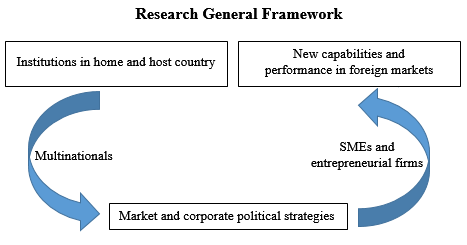CURRENT RESEARCH LINE
Multinationals and entrepreneurship in emerging markets
CURRENT RESEARCH LINE
Multinationals and entrepreneurship in emerging markets
My current research is divided into two streams. The first focuses on multinationals’ strategies from and in emerging markets, and the second on strategies of internationalization of small and medium enterprises from emerging markets and developed countries.
My research on multinationals aims to contribute to theories of market and non-market strategies – how multinationals from both developed and emerging countries respond to market and institutional failures in host countries and their country of origin.
One of my contributions to this research stream is a 12-year longitudinal, multi-method case study of one of the largest Brazilian multinationals in the extractive industry. The methodology, by including a survey, interviews with senior managers and an analysis of company documents and media over time, permits an understanding of the co-evolution of the company’s international strategy as market and institutional conditions change.
My second piece of research within this stream involves a study of the auto industry, in which the major contribution is in identifying how multinationals respond to institutional voids and transaction costs in emerging markets and the implications for performance. This study is also longitudinal in its approach and therefore contributes to the institution-based view of strategy and to the co-evolution perspective.
There are important common points between the projects in the first stream. The first is the role of corporate political activities and local institutions in the evolution of the international strategy of both the national and foreign multinationals.
The second stream of my research – international strategies by SMEs and entrepreneurial firms – consists of two research projects. Both investigate the effects of institutional incentives and constraints on the internationalization strategies of entrepreneurial firms. One of my projects focuses on high-tech firms in the biotech and software sectors. Another concerns international joint ventures (IJVs) between firms from developed countries and firms from institutionally weak countries. Both projects use the institution-based view and theories of adaptation and dynamic capabilities to understand how firms, through internationalization strategies, build new capabilities and improve performance. The common thread between these two projects (second stream) is the comparative perspective: how the quality of institutions in different countries affects the international operations and performance of small entrepreneurial firms.
The figure below is an elaboration of the common issues in between the two research streams.

Selected publications on the above
Multinationals
Doh, J., Rodrigues, S., Saka-Helmhout, A., and Makhija, M. V. (2017). Guest editorial on “International business responses to institutional voids” Special Issue, Journal of International Business Studies, 293-307, (forthcoming)
Rodrigues, S. B. and Dieleman, M. (2017). The SOE internationalization paradox: Untangling dependence in SOE- government relations. Presented at the Journal of World Business Workshop, April 23-25 in Vancouver, BC at Simon Fraser University
Duarte, R. and Rodrigues, S. B. (2017). Co-evolution of government and industry strategies: The case of the Brazilian automotive industry (working paper)
Rodrigues, S. B., Carvalho, G (2017). The automobile and component industry responses to institutional voids in emerging markets: A co-evolution perspective (working paper)
Rodrigues, S. B. and Dieleman M. 2016. Internationalization as co-evolution of market – and nonmarket strategies: The Case of Vale. In: Van Tulder R., Verbeke, A; Carneiro G. and Perez, M. A. The Challenge of BRIC Multinationals. Bingley, UK: Emerald: 269-294
Van der Lugt, L. M., Rodrigues, S. B., & Van den Berg, R. (2014). Co-evolution of the strategic reorientation of port actors: insights from the Port of Rotterdam and the Port of Barcelona. Journal of Transport Geography, 41, 197-209
Rodrigues, S. B. (2013) Understanding Environments in Emerging Markets: the social costs of institutional voids. Farewell Address Series. Erasmus Research Institute of Management. ERIM:EFA-2013-002-S&E, ISBN 978-90-5892-339-4, pp:4-53
Child, J. Tse, K. and Rodrigues, S.B. (2013) The Dynamics of Corporate Co-evolution. London: Edward Elgar
Rodrigues, S.B. and Child, J (2009). Corporate Co-evolution: A Political Perspective. Oxford: Wiley (Winner of the Terry Award at the Academy of Management 2009)
Entrepreneurial firms
Olie,R. and Rodrigues, S. B. (2017) Adaptation Responses to Institutional Voids in Developing Markets. Presented at the Academy of International Business, July 1-5 Dubai, 2017
Hiesh L., Rodrigues, S.B. Revisiting the Trustworthiness-Performance-Governance Nexus in International Joint Ventures. Management International Review, 54 (5): 675-705, 2014
Puthusserry, P.N., Child, J. & Rodrigues, S.B. (2014) Psychic Distance, its Business Impact and Modes of Coping: a Study of British and Indian Partner SMEs. Management International Review, 54(1): 1-29